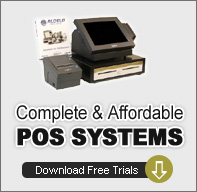Do I need a database server?If your business is large enough that you have multiple terminals for ringing up transactions, then a centralized database server is the way to go. Most POS software is designed to read and store data in a way that is configurable – meaning the data could be on the machine that is processing the transaction, or on a separate machine (database server) connected via local area network (LAN). The advantages of having a separate database server are manifold – there is one place to store, update, and retrieve information; one physical store that needs to be backed up; and one place to run reports from. Also, the hardware requirements for a terminal that only has to process transactions is less than one that also has to store and retrieve data. So you can spend your money on your database server and spend a lot less on the individual stations. Understanding your growth potential is critical before deciding on a POS solution. Some lower end software runs off of embedded proprietary or smaller scale databases, like Microsoft Access. Access is great for easy reporting and many end users have familiarity with its interface. But if you are ever going to scale up, this may not be the best solution. Some vendors are sophisticated enough to use the Access database “engine”, but separate out the data itself so that Access can be configured like a true database server. Again, this will suffice for a three or four terminal set-up, but growing beyond that calls for a more robust database, like Microsoft SQL Server ( a common solution employed by many vendors), or an open source database like MySQL. These solutions are designed for multi-user access and have more robust configuration capabilities than MS Access. |
Copyright © touchPOS.net. All rights reserved.








